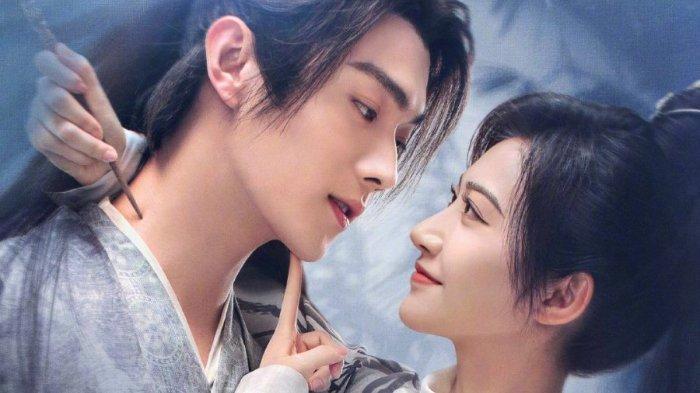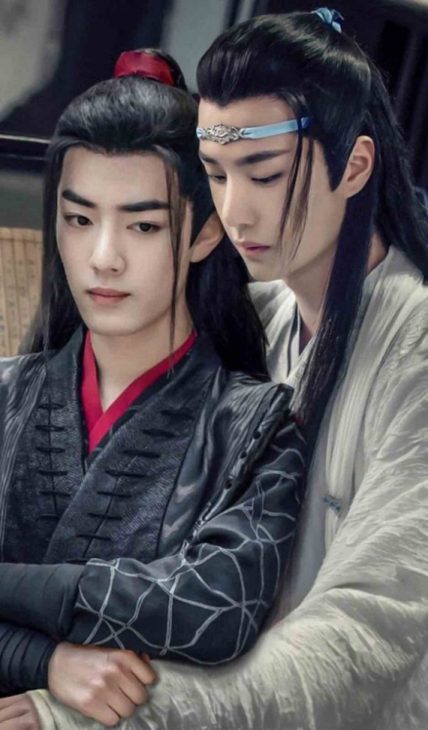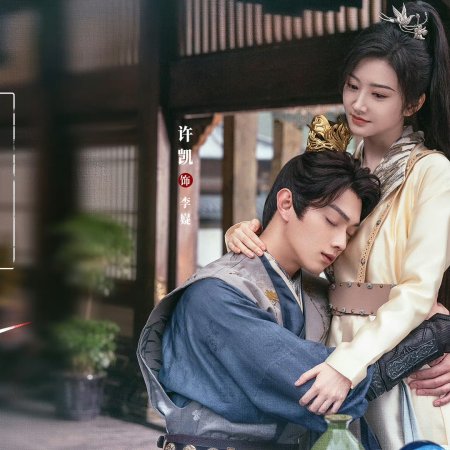Maybe I Am Romantic

Good afterevenmorn (whenever you happen to be reading this), Readers!
I’m still on a Chinese costume drama kick. It has been my crutch when dealing with the terribleness of the world of late. I don’t know why, but there we have it. Everyone who knows me is sick to death of me proclaiming my love for The Untamed, which remains the golden standard for serialised Chinese costume dramas for me. Since then, and since I last mentioned it here, I’ve watched a number of them (when I tell you I’ve spent the majority of my time rotting on the couch watching unfairly beautiful people swan about in obscenely beautiful clothing, I mean it). Some were silly. Most of them were entertaining. One in particular I have added to my ‘would really like to own on DVD/BluRay’ list. It has a dumb as hell title (Wonderland of Love. Had I not seen a short of one of the battle scenes in the series on YouTube, I would not have watched it at all based on that title), but was a great story. I did a review of it on my personal blog.
It has gotten me thinking. Because the afore mentioned drama had such a ridiculous title, and many of the ones I’ve watched were along those lines, I’ve started to question what I thought was a fundamental aspect of myself. You see, I am not romantic. Ignore what author Evan May wrote for a blurb on my book Human. What romantic soul? I have none. What rot!
Carrière has combined her keen historian’s mind and romantic soul in creating Aleksandar Svetoslav, a character who demands your attention and then takes you on a darkly compelling journey.
– Evan May. In case you were wondering what he said.
It’s not true. Not in the least. I’m not particularly wowed by the presentation of flowers, for example. I’m told they’re supposed to be romantic, but you just gave me a bunch of meaningless work, actually, that I am now forced to watch slowly die. Thanks, I guess. Grand gestures of love make me uncomfortable at best, physically ill or genuinely irritated at worst (I’m so glad ‘promposals’ weren’t a thing when I was a tween). Romantic stories either on screen on or paper practically give me the hives. I find them trite, annoying, shallow and stupid.
Please note that I’m not poo-pooing Romance as a genre. Romance cops enough flack from people. They don’t need me to pile on. I don’t think Romance writing actually is stupid or in anyway less valid or brilliant than other kinds of genres. That’s not it at all. It’s just not for me. I might be a little bitter, maybe. I’m very glad it brings a lot of joy to a lot of readers/watchers. I’m just not one of those people.
So why, then, do I adore Chinese costume dramas so much? They are all romances, of a kind. Why am I so happy to dive into them, when romance in general makes me irrationally irate?
I’ve been thinking a lot about it.

I think I’ve stumbled on why.
In western Romances, the romance is the point and purpose of the story. The greatest stake in Romances, generally speaking, is whether or not the hero and heroine will fall in love and be together. Spoiler: they will. That’s it. There’s nothing else to it. Which is fine, if that’s your thing. What happens around them is often of little importance, and exists only to drive the pair together (after spending some time driving them apart, probably).
It’s different in Chinese costume dramas. The stakes are usually incredibly high, and the romance serves to complicate the circumstances, rather than have the circumstances complicate the romance. The romance is an enormous part of the plot; essential, even, but it’s not the whole thing. Often times, the whole world is at stake. In The Longest Promise, the god of chaos and destruction threatens the existence of the entire continent. The hero and heroine must battle this entity together; while trying to carve out some time and space for their love. The story has a number of romance tropes that we would recognise; master falling for his student, misunderstandings, a love triangle, personal ambition getting in the way of love… there’s a lot in there that is quite typical of romances western audiences would be familiar with.

Yet I don’t find them trite or annoying I think precisely because the coupling is not the ultimate goal of the story. The same is true for Fateful Love (listen, a lot of these titles are just awful), which has a woman fall thought time and space to inhabit the body of her doppelgänger in order to save the world from a maniacal, power-hungry king and his necromancer.
Also, as a side note, to anyone who thinks asking for consent is unsexy really needs to watch this one scene in Fateful Love… For reasons.
In Wonderland of Love (ugh. These titles are so bad), the stakes are not the romance; its the quest to take back the imperial throne from a usurper who murdered the entire imperial family (almost) and restore peace in the empire to stop the people suffering while the wealthy wage their wars. All kinds of things are going on while the hero and heroine undergo their enemies to lovers tale; unfettered ambition, familial betrayals, attempted fratricide, kidnappings, battles that make you cry so hard you have to drink an entire litre of water to make up for it…
Yes, the couple gets together. But there’s an empire that needs saving, damn it. Which isn’t to say that the rest of the series isn’t fantastic following the couples uh… coupling. It absolutely is. It also continues to be terribly romantic. The hero is deeply in love, Readers. SO in love. It’s so sweet I make myself ill just thinking about it.

Further, a happily ever after is never guaranteed with a Chinese costume drama. Sometimes, the heroes are separated at the end; one may die, as is the case in The Longest Promise. Perhaps even both. Even if the main pair make it, many of the side characters will not. In Snow Eagle Lord, the deaths of the pair in one of the side couples nearly broke me. Or the needs of their world demand that they abandon their personal desires to serve the greater good. In Wonderland of Love, there is a happy ending, but there’s also a slight twinge of sadness to it. Both the hero and the heroine get what they desired, in the end, but the price was steep indeed.
These endings are much easier for me to believe than the typical happily ever after we get in the majority of western (or at least Hollywood) romances. I will make an exception for Ever After, which for some reason I also adore, bad English accents for French characters and all. I don’t know why, either.
I think the approach to romance in these dramas matches my own when I’m writing. There are usually pretty involved romance B-plots in my books, which are profoundly important to the story, but they’re not the reason for the story. In Human, vampire prince Aleksandar Svetoslav falls in love with a human woman, but the real issue is the politicking by the vampire council that threatens Aleksandar’s entire house. Same for Skylark, actually. Commander Skye falls in love with an alien woman, which is so important to the plot, but the real issue is the imminent invasion by a different group of aliens. In Daughters of Britain, Adalbern’s love for the Briton Mederei is instrumental in helping her escape Rome’s grasp and continue the struggle for freedom in northern Britain, but it is that struggle that is the central focus of the story. In my upcoming 2026 release (currently called The Lioness of Shara Mountain, but that might change depending on the whims of the publisher), there is a deep, profound, but also very platonic love that is central to the story, but the real issue is the invasion of the semi-nomadic people of the north, who have joined forces under a the banner of a new and very dangerous warlord.
I think I adore Chinese costume dramas, and their prodigious use of romance tropes, because the stories are bigger than the romances themselves. I even find myself adoring the romance plots and tropes, which normally make me roll my eyes or gag, because they are used to further the epic, rather than be devices in and of themselves.
So maybe it is true. Maybe Evan was right.
Maybe I do have a romantic soul.
(Gross)
When S.M. Carrière isn’t brutally killing your favorite characters, she spends her time teaching martial arts, live streaming video games, and cuddling her cat. In other words, she spends her time teaching others to kill, streaming her digital kills, and a cuddling furry murderer. Her most recent titles include Daughters of Britain, Skylark and Human. Her serial The New Haven Incident is free and goes up every Friday on her blog.
I am not romantic either, but I have a excuse …I am a guy.
What I have realized about romance in fiction is that best romances are actually about something else than romance. Pride and Prejudice is about a lot of stuff other than the romance. It’s a comedy of manners. It deals with the most British of subjects: class. Et cetera. Casablanca is not about the romance it is about doing the right thing despite personal consequences. Titanic is about…actually Titanic was horrible.
If I do care about which characters get together its in a series about something else. I cared about Mulder and Scully’s relationship but I was always more concerned with the aliens and monsters.
Psht! I know plenty of guys who are unredeemable romantics.
And yes. I think you and I think very similarly in this case.
Maybe I’m just a contrarian (no maybe about it, actually) but I feel just the opposite. “Raising the stakes” makes me care less, but the narrower the focus, the more involved I get. What do I care about the fate of empires or dynasties? I have no experience of them; the only thing I’ve ever known are the small lives of vulnerable individuals (mine included). I know it’s a different genre, but the “The Universe Is at Stake!!!” trope is part of what’s ruined superhero movies for me. It’s too easy, and it’s dishonest – you know very well that the universe isn’t at stake, because if everything ended there couldn’t be another installment in the franchise.
In Romeo and Juliet, do you care more about what happens to Verona or to these two teenagers? And for me, anyway, the most intensely romantic movies are the great screwball comedies of the 30’s and 40’s, where literally nothing was at stake but the lovers’ pride.
It’s all a just a matter of taste and temperament, I suppose.
Fair, but I don’t care much about Romeo and Juliette, actually, other than it being a cautionary tale/tragedy (though I honestly shed no tears over it). I never found that story particularly romantic, for all the swooning I saw people do over it. Which is partly why I rejected the idea of being romantic at all.
And Verona wasn’t in trouble in this story, so of course I wouldn’t care about its fate. It will be just fine should one or both of these teens died/lived/whatever. Their fate ultimately didn’t matter at all. If there had been a real threat to Verona – an enemy coming to lay siege or a villain within the city that needed confronting, in which this romance would have played a key role, I absolutely would have cared what happened to that city. And probably cared more about what happened to those teenagers, to be frank.
It’s part of the reason I quite enjoyed the Marius, Eponine, Cosette triangle in Les Miserables and found it infinitely more tragic (I’m team Eponine and always will be). It was happening against a backdrop of the fight for independence. It meant something (to me).
So yes, it is just a matter of taste and temperament.
I do think most of these dramas do a really good job of finding the personal within the epic. You care about the characters… or I care… and what they’re put through. It’s the same reason I adore The Malazan Book of the Fallen series so much. Erikson does the same thing – find the incredibly personal within the epic; the general stakes are high, and it heightens the stakes for the characters.
Do you bite your thumb at me, Ma’am?
Room a plenty for everyone to like what they like, but I do think you soft pedal the threat to Verona. The two leading families of a city-state constantly engaging in vicious brawls in the streets is pretty much the definition of being in trouble; that threat, being internal (familial, so to speak), is even worse than one coming from the outside; at least Prince Escalus thought so: “If ever you disturb our streets again, / Your lives shall pay the forfeit of the peace.” That ain’t a jaywalking penalty.
Is the law of my side if I say “ay”?
But I suppose. It just wasn’t really made much of, from my recollection (granted it’s been a while since I studied Shakespear, and when I did I was so annoyed by everyone going gaga over the love stories I think I might have blocked everything out).
Then give R&J another try – I think you’ll see that it’s a perfect combination of what you like and what I like, a story where the personal and the “political” amplify and reinforce each other, where in the end they’re one story and the two levels are not really separable at all.
Maybe.